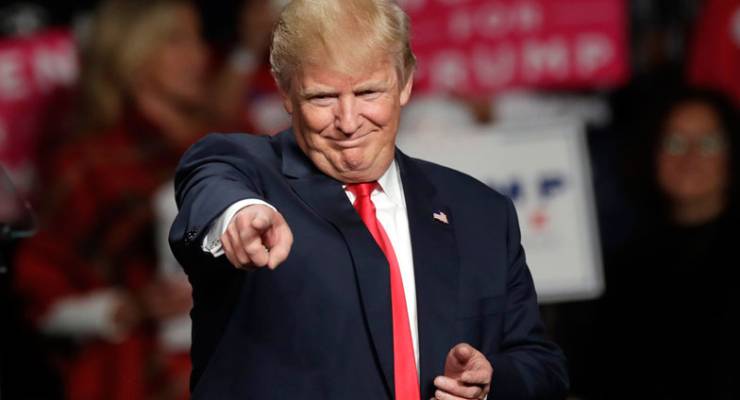
Voters are now hostile to free trade, want manufacturing jobs restored and think racial equality has “gone too far”, today’s Essential Report shows. And there is strong support for another crackdown on 457 visas.
Both the government and Labor have committed to cutting back on 457 visas, with the government looking to play catch-up after Labor pursued the issue during the federal election and then in the wake of the election of the openly racist Donald Trump in the United States. Labor announced a policy to curtail visas in Townsville last week, and the government rushed to follow suit. According to Essential, 64% of voters support cutting back short-term visas, including 66% of Labor voters and 74% of Coalition voters. The level of 64% support is up from 58% in 2013, when Julia Gillard tried to exploit the issue.
Essential also asked voters to respond to a series of statements on economics and social issues.
Voters clearly yearn for an old-fashioned Australia, with manufacturing jobs and closed borders, as well as less racial and, in many cases, gender equality: people believe “free trade has gone too far” 43% to 29%; “the government should bring back manufacturing jobs to Australia” 83% to 9%; China is seen as having too much economic influence by 65% to 18%; racial equality has gone too far in the eyes of 46% of (presumably white) people; 40% believe gender equality has gone too far, but 48% disagree.
Each of these issues splits voters in different ways. Liberal and Labor voters are indistinguishable on free trade, though Greens voters — despite being despised as chattering class elitists — are more in tune with the conservative commentariat in supporting free trade. “Other” and Labor voters are most strongly in favour of the return of manufacturing jobs (91% and 88% support, respectively), but there is slightly less support from Coalition voters (82%) and Greens voters (78%); Labor, Coalition and Greens voters differ little on the influence of China on the economy, especially compared to “other” voters, 75% of whom think China has too much influence.
But voters split differently on cultural issues: Coalition and “other” voters are far more likely to think racial equality has “gone too far”; similarly with gender equality, where Coalition and “other” voters (both 52%) are far more likely to agree it has “gone too far” than Labor (32%) or Greens voters (21%). “Other” voters are far more likely to believe “the system is rigged against ordinary people” (77%) compared to the rest of the electorate, although Greens and Coalition voters (52% and 56% respectively) differ very little on that question.
Voters are also highly interventionist on food regulation, supporting an array of nanny state measures relating to so-called junk food and high-sugar products — although tax increases to discourage consumption appear less popular than other measures.
There’s also strong support for the government’s proposal to resettle refugees currently on Nauru and Manus Island in the United States, with 56% of voters backing it and just 16% opposing it.
On voting intention, the Coalition has picked up a point to 38% while the Greens have dropped one to 10%. The other parties (Labor 37%, NXT 3%, One Nation 6%) remain unchanged, for a two-party preferred outcome of 52%-48% in favour of Labor, down from 53%-47% last week.










Very interesting and helpful article. You refer, however, to the Coalition being up 1% to 38% – and then comment on the results for Labor (37%) and “other parties”; the Coalition comprises two parties.
I suspect that the interesting data in this is the demographic breakdown. It’s likely that these results are influenced by the ageing of the population and the baby boomer bulge. Anyone who thinks they would like to see Australia more like it was in the past has clearly forgotten what the past was actually like.
Not that things are great now, at all, it’s just that every positive from the past can be weighed against just as many negatives in my mind. Surely the young aren’t hankering after the past!
Given the fact that ‘The Past’ is largely a state of emotion perhaps the young feel it but can’t categorize it?
Voters yearn for an old-fashioned Australia where they had jobs, job security, one income was enough to comfortably live, buy a house and raise a family in it, immigration planning was about making the country better rather than cramming in as many people as possible into Sydney and Melbourne, and trade was about trade rather than offshoring responsibility and boosting profit margins.
The catastrophic failure of neolibrealism is becoming harder and harder to ignore. The tragedy is that people like Trump and Hanson are the flagbearers.
What is blowing my mind is that the Greens are well positioned to take economic and moral positions on all these domestic issues perfectly consistent with their policy platform and beliefs, but they seem to be scared of attracting the “wrong” type of voter and have focussed on dissing Donald Trump to keep said “wrong” type of voter away. Utter madness.
Poor fellow, my country.
Seriously BK, this whole anti-free trade = racism thing is getting a little tired …
If we’ve learnt anything from Brexit and the Trump ascendency, isn’t it to not to put any faith in polls?
Polls?
Or as Machiavelli warned, “Put not your faith in Princes, my Prince.”?